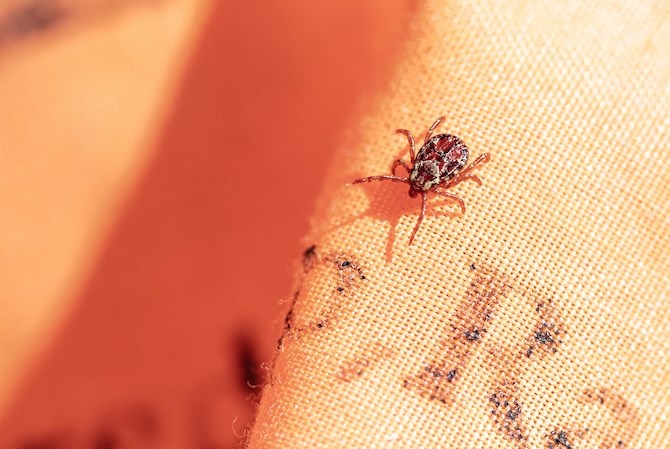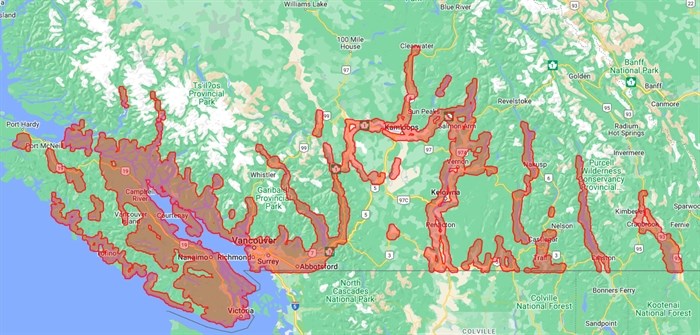
A Rocky Mountain wood tick is seen in this June 18, 2018 photo.
Image Credit: FLICKR / NPS / Jacob W. Frank
May 28, 2022 - 1:55 PM
A health authority in B.C. has identified Kamloops and the entire Okanagan Valley as high-risk areas for Lyme disease.
The map may indicate a shift in public messaging.
President of the Canadian Lyme Disease Foundation Jim Wilson said it’s long overdue for public institutions to recognize that the disease is communicable in B.C.

Kamloops and the Okanagan are among the areas highlighted on this map of high-risk Lyme areas in B.C.
Image Credit: SUBMITTED/Port Moody Health
“They’re finally acknowledging what we’ve known for some time,” he said.
“It is here, has been here and that it’s something the public needs to know.”
Wilson and his family live in West Kelowna, and his son and daughter both contracted Lyme disease while living there.
READ MORE: Interior Health: It's time to talk about ticks
He believes public institutions are aware of the prevalence of the disease but have been slow to release the data.
“It’s unfortunate because that’s our tax dollars used to gather that data, withholding it is harmful.”
Wilson is pleased to see the map was published to warn the public about danger zones but said ticks can be found almost anywhere in the province, as they like to hitch rides with migratory birds.
“That map shows certain areas but there is no area with zero risk of contracting Lyme disease… some people may be surprised to realize ticks may be in their front yard.”
Wilson hopes the next step in B.C.’s fight against Lyme disease will be better testing. He believes “a significant percentage” of British Columbians are currently living with Lyme disease who don’t even know it, as many tests produce false negatives and many doctors misdiagnose the disease as other neurological issues.
It’s important for people with Lyme disease to know they have it as early as possible to maximize treatment options and recovery outcomes, he said.
READ MORE: TICK SEASON: Penticton hikers found six on their bodies
The B.C. Centre for Disease Control says on its site that the rate of Lyme disease has remained low in the province, “unlike in Eastern Canada.”
For those who are bitten by a tick, the B.C. CDC says infection can be prevented by removing attached ticks early.
“In B.C., less than 1% of ticks tested carry the bacteria B. burgdorferi that cause Lyme disease,” according to the website.
“Although the number of ticks submitted for testing has increased in recent years, the prevalence of B. burgdorferi in ticks has remained consistently low over time.”
READ MORE: Why this mangy moose near Kelowna lost it's winter coat so fast
And there may be more humans and ticks crossing paths compared to in the past.
James Steidle from Stop the Spray B.C., an anti-herbicide advocacy group, believes encounters between ticks and humans are increasing due to habitat loss.
“You get more hosts, more wildlife hanging out in the natural habitats that are left,” he said.
“If the animals they feed off of are concentrated in a smaller area … ticks are going to have an easier time reproducing.”
To contact a reporter for this story, email Dan Walton or call 250-488-3065 or email the editor. You can also submit photos, videos or news tips to the newsroom and be entered to win a monthly prize draw.
We welcome your comments and opinions on our stories but play nice. We won't censor or delete comments unless they contain off-topic statements or links, unnecessary vulgarity, false facts, spam or obviously fake profiles. If you have any concerns about what you see in comments, email the editor in the link above.
News from © iNFOnews, 2022